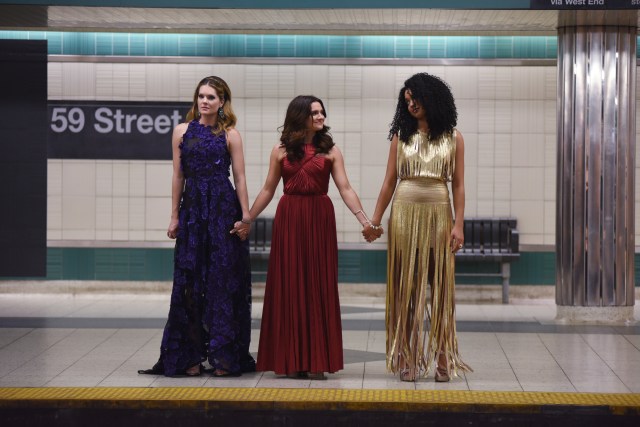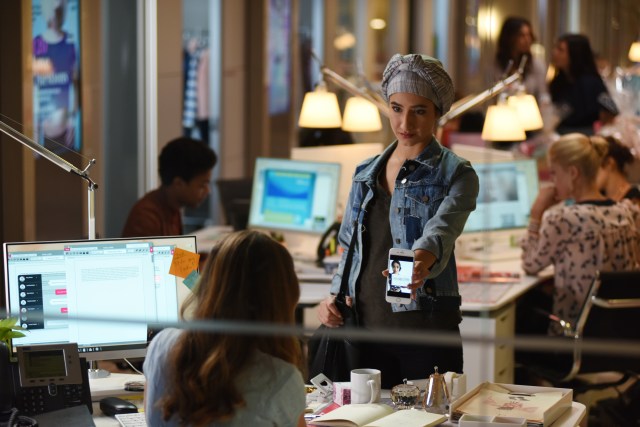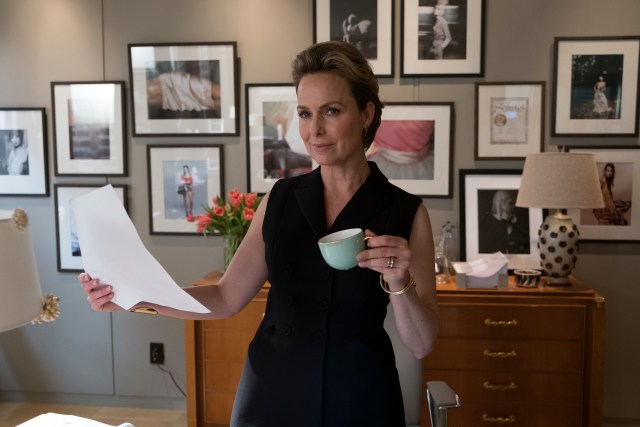In the pilot of Freeform’s new summer drama, The Bold Type, the editor in chief of Scarlet says to the people attending the magazine’s 60th anniversary gala that yes, it’s a fashion and beauty magazine, but it’s not just a fashion and beauty magazine. “Here’s the next great mascara, to give you bigger eyes to see the world,” she says. “Here’s a fabulous pair of jeans; now, go climb a mountain.” It’s a recurring theme in the show’s first two episodes, the Scarlet staff — including our main characters: newly promoted writer, Jane; social media director, Kat; and executive assistant, Sutton — pushing back against the idea that a “women’s magazine” can’t be a feminist magazine.
Oh, it dangles the bait right out there. “This month, in our desire and devotion section,” EIC Jacqueline Carlyle beams, standing in front of a giant picture of a vibrator in a room full of predominantly male board members, “I present to you, ‘Mount Up and Ride.’ From side-saddle to bareback, we’ve got positions guaranteed to make you yee-haw!” But the cynics The Bold Type focuses on aren’t old white guys; they’re women. Specifically, a Muslim lesbian photographer named Adeena who balks at having her work showcased in the magazine.

Social media director Kat takes Adeena’s skepticism as a personal challenge. She visits her in her studio, where she’s photographing Muslim women holding signs that describe their life experiences and interests in a way she hopes will reveal their humanity to a country steeped in Islamophobia. Adeena defies Kat’s claims that Scarlet is a political publication, and Kat challenges Adeena right back. They dance around each other, both unapologetic in their claims on feminism, and finally find common ground in the “Mount Up and Ride” cover story vibrators, which pique Adeena’s interest when she visits Scarlet‘s office because they’re illegal in her home country (which the writers never describe beyond a vague mention of the Middle East).
As Kat helps her disassemble and pack up the sex toys like contraband, they talk about why Adeena still wears her hijab and whether or not Kat is queer. Kat says she’s not, but there’s something humming between them and they both know it. By the end of the night, Adeena is so charmed she agrees to let Scarlet publish her photos.
And then she gets arrested in the airport when she arrives back home.
Kat’s not the only one with intersecting work and personal crises. Jane has trouble executing her first assignment as a Scarlet staff writer. Her first pitches fall flat and the one Jacqueline latches onto — how to stalk your ex when they’re not on social media — means Jane has to confront her first real heartbreak, literally, and find answers to all the questions she’s been pummeling herself with since her boyfriend left her on her birthday in the middle of Grand Central Station. Sutton is trying to navigate a blossoming (secret) relationship with one of the board members.

It’s rare for a pilot to bring even one character arc to a satisfying conclusion, as everyone usually get bogged down in expository dialogue about their clunky decisions, but The Bold Type manages to sketch out Kat, Jane, and Sutton; color in the lines of their characters; and take all three of them on a journey that ends in personal triumph. By the episode’s end, it’s hard not to feel invested in all three of them, and in their friendships with each other. Also, miraculously, in Jacqueline’s relationship her magazine and the women who work for her. You think you’ve seen her character a dozen times before, just another paint-by-numbers Miranda Priestly. And sure, she’s a boss and she’s not sorry for it, but the power she has over the women who work for her is freely given. She’s so much more than stone cold ambition.
The show’s second episode, “O Hell No,” which aired back-to-back with the pilot last night, expands on the groundwork it laid in the first 42 minutes. Kat visits Adeena’s art show when she comes back to the States and does another “I’m not queer but I’m definitely saying I’m not queer too much to not be queer” waltz with her. Jane struggles to get out of her own head and preconceived notions about what a “real” writer is. She doesn’t want to be just another sex columnist. Sutton has dreams of becoming more than an assistant (and a girlfriend), but they’re not specific; she hasn’t found her path forward like her best friends. And Jacqueline is still full of sage advice and unblinking, eyebrow-popped gazes when she’s waiting for an answer to the incisive, gut-check question she just asked.

The Bold Type‘s ability to pull off so many small feminist victories in just two episodes is fun to watch; that those feminist victories exist in this format is extra exciting. Freeform’s TV shows are focus grouped to absolute death. Read The New York Times review of the series if you need proof. And what Freeform discovered on their recent deep dive into What Young Women Want is exactly what the fictional Scarlet magazine strives to give to its readers: “It’s feel good, it’s sexy, and it’s just the right amount of political.” Kat, Jane, and Sutton pep talk each other with SnapChats of Elizabeth Warren captioned “Persist!” The magazine company they work for is called Steinem. They promise, right out loud, to crush the patriarchy. When Jacqueline addresses the people gathered for the 60th anniversary gala, she says, “You are the women and the men who work at Scarlet.” It tugs on your ears because you’ve heard the “men” before the “women” all of your life. Every feminist has to start somewhere.
What’s particularly impressive — subversive, even — is that Scarlet takes on the naysayers in the form of a Muslim lesbian. The challenge to the magazine’s legitimacy doesn’t come from handsome young lawyers who sleep with assistants, or curmudgeonly board members who’ve never seen a vibrator. Scarlet isn’t interested in acquitting itself to any man. And as the magazine repeatedly rejects the reductive assumption that sex and feminism and fashion and politics can’t coexist, so does the show itself.








Comments
And then there’s this little nugget.
http://waverlyyearp.tumblr.com/post/162888202293/i-was-gonna-gif-this-but-its-better-if-you-just
I have no words. #incredible
Oh. My God.
Nikohl Boosheri playing another queer character! *heart eyes emoji x 100*
YES!! I knew I recognized Nikohl Boosheri’s gorgeous face from somewhere, and I was right — she was one of the lead characters in Circumstance (2011).
Praise the Lorde, she’s back in queer media!
I am loving this show so far! I love the friendship between our main three characters and how all the female characters really lift each other up–I don’t think there’s been any moments of cattiness/pettiness (that I noticed) even in interactions with the more minor characters, which is so refreshing, especially for a drama.
And I LOVE the chemistry between Kat and Adena, and can’t wait to see where that story line might go. I really empathize with Kat in their scenes together–how happy she feels, how confused that makes her, how crushed she was to see Adena with another woman at the end. Really excited to see everything play out.
Also some really great funny moments! “Hold my fitbit” before going in after the Yoni (sp?)… I died lol
I saw that first photo and instantly thought “Aria finally finds polyamorous happiness (and never visits Ezra in jail)!”
I just watched the two episodes and I like it a lot so far! The characters/relationships are compelling enough – especially Kat and Adeena, who have great chemistry – and it doesn’t seem to be setting up too many complicated soapy Freeform-y plots (at least right now). Here’s hoping for the best!
I was not going to watch this show because I still can’t get Katie Stevens as Karma out of my head but I did turn it on, the second I heard that Aisha Dee is talking with an American accent instead of her beautiful Australian one, I am out once again.
This all sounds very promising, but the real question is – who am I gonna ship with Jacqueline, à la Cat & Kara and Miranda & Andy? Because yes, I freely admit that is %100 my favourite fan fiction trope.
Same. I spent the entire episode split between telling myself that I didn’t need another powerful 50yr old to stan and the other half wondering how I could Mirandy/Supercat this show.
Also, can I just say, thank you Heather for this detailed and informative review of this show. I read a review by a straight female writer, and she basically just spent the entire article bitching about how the girls’ clothes and apartments are too nice for their jobs and salaries.
http://www.avclub.com/review/bold-type-paints-fun-unrealistic-picture-life-big–257835
I mean yes, those things can be annoying, and I do agree with her point about the absolutely profusion of shows about 20-somethings in Manhattan, but none of that really says anything about what the show IS.
ALSO – Aisha Dee was Kennedy on Sweet/Vicious, and even though it was unforgivably cancelled after only one season, that one season is AMAZING and you should all go back and watch it.
Not only was Aisha Dee super fantastic in Sweet/Vicious (which itself, like you’ve said, is AMAZING), but she was also more than perfect as Beth in Chasing Life.
This. Show.
I’m tempted to watch but I went to school with the actor who plays Sutton and that’s going to be distracting as heck. I don’t think I’ll be able to separate the real person from the character. But it sounds like there’s a lot of other stuff going on that I would really appreciate! I guess I can try watching and if I’m too weirded out by Sutton to continue I can just watch Kat/Adeena supercuts on youtube.
This was a really fun show and I agree about Melora Hardin’s character being refreshingly non-Miranda Priestley while also being a badass. Some good summer candy to watch.
I liked that they didn’t specify Adeena’s home country — safer for a fluffy show like this to avoid really stepping into those waters.
But yes, the Canada-for-NYC stuff was distracting! They put in some nice CGI effort with the outdoor scenes but that subway platform and the train itself were ridiculous.
I really hope the show delves into Adena as a person rather than just using her as a foil for Kat to explore her own identity. The LGBTQ+ Muslim community is fierce and beautiful and deserves to be represented on TV.
I just watched the first two episodes, and OMG I am HOOKED. I fucking love this show.
I only just watched the first episode but I’m so in love with it so far.
Also, can I just say I want to send an edible arrangement to the person who wrote EIC Jacqueline Carlyle’s speech at the Scarlet 60 party?
I love everything about this show so far and cannot wait to see more!
The Bold Type had just been released on Amazon Prime UK (which happily coincides with me having a free trial). I have watched the first two episodes so far and love it. Although I am actually disappointed that Sutton didn’t take th financially sensible job. I mean following your dreams is great but as th hinted at and then dismissed, people need to be able to afford to live.
I think doing your dream job is a middle class, Western luxury and if you are able to do that it’s great, but actually doing a job to pay your bills and look after yourself and any dependents and maybe get enough money to spend some of their spare time doing something they love does not make them weak or wrong and this narrative makes me angry.
I am glad I have people who empty my bins and clean my office and package books I want to read. I can’t imagine they are all doing their dream jobs (though if empty bins is someone’s dream job that is great too) but they are doing jobs that need doing.
Thank you for this. You’re 1250% right
I’m embarrassed by all the typos, I must learn to proof read.